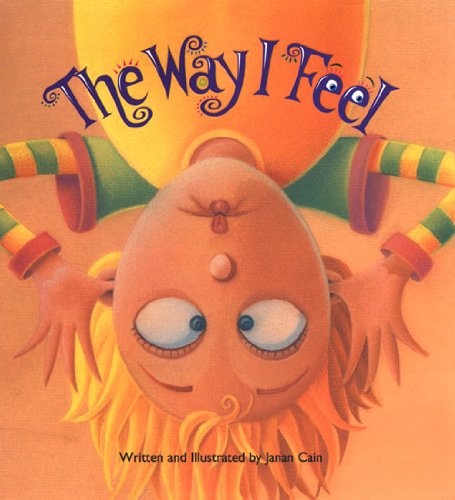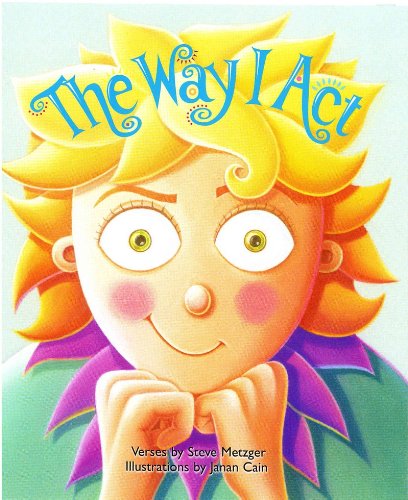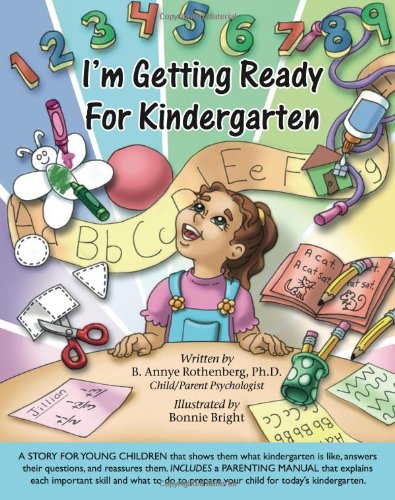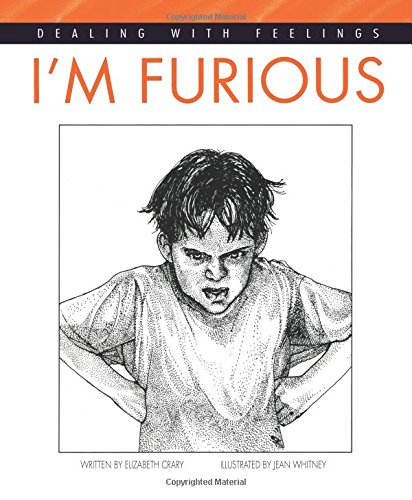-
The Way I Feel
Janan Cain
Board book (Parenting Press, Jan. 1, 2005)Our most popular children's book, now with 1.2 million copies in print. Praised by parents, who say it's especially valuable when getting children to talk about the day's triumphs and troubles, and by professionals, who use it in pediatric clinics and with the developmentally disabled and emotionally troubled. Janan Cain's kids ooze anger and bounce with excitement as they teach the words for emotions. This award-winning, full-color book comes in two editions. K
K
-
The Way I Feel
Janan Cain
Hardcover (Parenting Press, Jan. 1, 2000)Feelings are neither good nor bad, they simply are. Kids need words to name their feelings, just as they need words to name all things in their world. The Way I Feel uses strong, colorful, and expressive images which go along with simple verses to help children connect the word and the emotion. Your child will learn useful words, and you will have many chances to open conversations about what’s going on in her/his life. Recommended by parents, teachers and mental health professionals, The Way I Feel is a valuable addition to anyone's library. This book is ideal for children with autism. (Ages 2-8) K
K
-
The Way I Act
Steve Metzger, Janan Cain
Hardcover (Parenting Press, Jan. 1, 2011)The Way I Act explores thirteen ways of behaving. The friendly verses and bold illustrations convey many positive ideas of how to act in a variety of situations. In the companion book, The Way I Feel, children learned that feelings come and go and simply are. A little older now, they are ready to think about the ability they have to control how things turn out. Like The Way I Feel, this book is ideal for children with autism.(Ages 4-9) O
O
-
The Way I Feel
Janan Cain
eBook (Parenting Press, Feb. 5, 2019)Feelings are neither good nor bad, they simply are. Kids need words to name their feelings, just as they need words to name all things in their world. The Way I Feel uses strong, colorful, and expressive images which go along with simple verses to help children connect the word and the emotion. Your child will learn useful words, and you will have many chances to open conversations about what's going on in her/his life. Recommended by parents, teachers and mental health professionals, The Way I Feel is a valuable addition to anyone's library. This book is ideal for children with autism. (Ages 2-8)
-
It's MY Body: A Book to Teach Young Children How to Resist Uncomfortable Touch
Lory Britain
Paperback (Parenting Press, Jan. 1, 1982)It's MY Body has been written in order to help adults and preschool children talk about sexual abuse together in a way which minimizes embarrassment and fear, but emphasizes self-reliance and open communication. You will not find specific references and stories about sexual abuse in this book. Preschool children are not ready for detailed discussions of this issue. They are ready, however, to learn how their feelings can help them make decisions about sharing their bodies, and how to communicate those decisions to others. This kind of learning serves as a vital first step in the protection of children from sexual abuse. It's MY Body introduces two touching codes which children can use to protect themselves when they're uncomfortable. Popular with preschool teachers and pediatricians, who report children sometimes practice the protective phrases on siblings and dolls. O
O
-
I Want To Make Friends
B. Annye Rothenberg, Bonnie Bright
Paperback (Perfecting Parenting Press, )None
-
I Don't Want To Go To The Toilet
B. Annye Rothenberg, Nina Ollikainen
Paperback (Perfecting Parenting Press, March 1, 2011)Is toilet training your youngster much more challenging than you expected? Is your child uninterested? Does she keep having accidents because she doesn't want to stop playing to go to the toilet? Does he always say no when you ask "Do you have to go peepee (or poop)?" Or maybe your child is peepee trained but doesn't want to poop in the toilet? Is he having constipation because of all this? Are you worried that your child won't be able to go to preschool or maybe even to Kindergarten because he's not toilet trained? Is your youngster holding in her poop for days, doesn't want to eat and is frightened when the poop gets so big, it has to come out? In this book, there are two stores for preschoolers - one on peeing and one on pooping - and a guidance section for parents. The first story is Going Peepee. Katie's parents say it's time to start going peepee in the toilet, but Katie doesn't want to stop playing to go. She has lots of accidents. With creative guidance from her parents, Katie starts to see all the advantages and decides she will go peepee every time in the toilet. In the second story, Going Poop, Ben doesn't like pooping in the toilet. He doesn't like the way his poop feels coming out. He figures that he can tighten his bottom every time and hopes to never have a poop again. But when it has to come out, he gets scared. His parents help him become brave enough to overcome his reluctance and be successful. The parents' section provides expert guidance on when and how to toilet-train your preschooler. It explains what is the child's view on toilet training. Learn the most age-appropriate tools to motivate youngsters who are uninterested, reluctant, and fearful. Specific advice shows parents how to help children with frequent peeing accidents and children who are resistant and afraid of pooping in the toilet. This manual will clear up conflicting advice, and teach you the skills to guide reluctant youngsters toward toileting success. The parents' section captures the common issues that children have. This book is comprehensive - covering every toileting issue in step-by-step detail. Examples from other families will show how their youngsters became toilet trained including the five year old who said when she grew up her house wouldn't have any toilets.
-
I'm Getting Ready For Kindergarten
B. Annye Rothenberg, Bonnie Bright
Paperback (Perfecting Parenting Press, April 15, 2013)I'm Getting Ready for Kindergarten will help you know how to prepare your child for kindergarten. This all-in-one book includes a children's story to help your child have his questions answered, better understand, and feel more confident in starting "big kids" school. The parent guidance section will help you to be sure what skills and knowledge your child needs to be ready for kindergarten, and what exactly you can do to help prepare your child. You'll also be able to determine which areas your child needs your extra help. This book will enable you to see the whole picture of what is expected in today's kindergarten. Major topics include: Developing emotional and social maturity, including getting along with friends and adults Academic preparation, including readiness for reading, writing, and math Learning to do what you and teachers ask What children should be able to do for themselves and for the family Communication, including speech and language readiness Coordination, including fine and gross motor skills Developing good daily routines for low stress kindergarten days This book will also help you if you're uncertain about sending your child to kindergarten this Fall or next. It will help you and your spouse make a more confident decision.
-
Self-Calming Cards
Elizabeth Crary MS, Mits Katayama
Cards (Parenting Press, Jan. 1, 1995)What can kids do when they're angry? Anxious? Frustrated? How about the mad dance? Or kneading bread? Or telling jokes? This 36-card full-color deck describes dozens of soothing strategies for both kids and adults. Written in both English and Spanish. A favorite of parents, grandparents, classroom teachers and special-needs professionals. P
P
-
Why Can't I Be the Boss of Me?
B. Annye Rothenberg, Bonnie Bright
Paperback (Perfecting Parenting Press, Sept. 1, 2015)You might have thought the elementary school years were going to be the easiest years in parenting. Then why do your kids insist on having their way? Why don't they accept that you're in charge? How come they're so disrespectful? What can you do about all this, because it's too frustrating and infuriating to put up with for another ten years? Even though it can be hard to admit that your family has this difficulty, you will find the insight and tools you need in this book so your children accept you, the parents, as the leaders of the family.This book has a story for children and a guidance section for parents. The story is about an eight-year-old who believes he should get to do whatever he decides. His parents hadn't realized how much they'd been giving in to him, but they start to realize how furious, defiant, and disrespectful he becomes when they don't. They know this can't continue. This realistic, informative, and empathetic story shows how they guide him to understand and accept his role in the family. The parent guidance section explains what to expect of kindergarten-to-third-grade children and how much say to give them. It tells why children won't do what we say and what to do about that. You'll find out how to motivate your children without bribery and what the newer and better consequences are. You'll learn the best tools to use so children will understand how much say they can have in decision-making while helping them develop compassion, reasoning, and problem-solving skills. You'll also gain tools for dealing with hard issues such as your kids refusing to apologize, lying, and doing homework. New insight into working with your parenting partner is provided. Through this book, you and your children will learn why they can't be the boss!
-
Mommy! I Have to Go Potty!: A Parent's Guide to Toilet Training
Jan Faull MEd, Helen F. Neville BS RN
Paperback (Parenting Press, Jan. 1, 2009)One of Parenting Press' most popular books, this reassuring guide to an important toddler/preschooler developmental period has been updated and expanded by Helen F. Neville, a longtime pediatric advice nurse and parent educator. Working with Jan Faull s original book, since 1996 a favorite for its practicality and real-life anecdotes, Neville explains how a child s temperament affects toilet training and she has added new chapters on: Toilet training the special needs child How parents and child care providers can work together during toilet training Explaining the early toilet training used in other culturesThis book remains a common-sense guide to determining if a child is ready for toilet training and introduces a step-by-step process that really works. Parents most common questions are answered and there s straightforward information on night training, bedwetting, constipation, bowel retention and soiling. O
O
-
I'm Furious
Elizabeth Crary, Jean Whitney
Paperback (Parenting Press, Jan. 1, 1994)A young boy discusses his feelings with his mother when his little brother ruins his possessions, and she suggests ways he can control his anger J
J